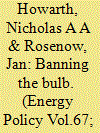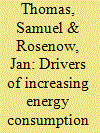|
|
|
Sort Order |
|
|
|
Items / Page
|
|
|
|
|
|
|
| Srl | Item |
| 1 |
ID:
128423


|
|
|
|
|
| Publication |
2014.
|
| Summary/Abstract |
Much academic attention has been directed at analysing energy efficiency investments through the lens of 'behavioural failure'. These studies have challenged the neoclassical framing of regulation which emphasises the efficiency benefits of price based policy, underpinned by the notion of rational individual self-mastery. The increasing use of a regulatory ban on electric lamps in many countries is one of the most recent and high profile flash points in this dialectic of 'freedom-versus-the-state' in the public policy discourse. This paper interrogates this debate through a study of electric lamp diffusion in Germany. It is argued that neoclassical theory and equilibrium analysis is inadequate as a tool for policy analysis as it takes the formation of market institutions, such as existing regulations, for granted. Further still, it may be prone to encourage idealistic debates around such grand narratives which may in practice simply serve those who benefit most from the status quo. Instead we argue for an evolutionary approach which we suggest offers a more pragmatic framing tool which focuses on the formation of market institutions in light of shifting social norms and political goals-in our case, progress towards energy efficiency and environmental goals.
|
|
|
|
|
|
|
|
|
|
|
|
|
|
|
|
| 2 |
ID:
191135


|
|
|
|
|
| Summary/Abstract |
How much tax should governments add to the prices of the energy that we consume? This question has come sharply into focus, as the reality of the need to decarbonise the buildings sector has become more urgent. Adding taxes and levies to energy prices encourages energy efficiency and raises revenues for governments, which can be dedicated to energy transition projects. But adding them disproportionately to electricity discourages us from investing in electrically powered heat pumps, a key technology in the buildings sector decarbonisation jigsaw. This paper shines a light on the imbalance in energy taxation across almost all European markets and makes the case for reform. We find that environmental costs are rarely well reflected in energy prices; and that the costs of energy transition programmes – and occasionally broader social policies – are overwhelmingly borne by electricity consumers. In this paper we explain the current structure of energy taxes and levies in five key European countries where reform would be beneficial, and set out four ways to rebalance energy taxes and levies, drawing on examples from around the continent.
|
|
|
|
|
|
|
|
|
|
|
|
|
|
|
|
| 3 |
ID:
171362


|
|
|
|
|
| Summary/Abstract |
Two years ago, the EU appeared to be well on the way to meeting its 2020 energy efficiency targets. 2014 final energy consumption was lower than in any year since the 1980s and lower than the level required in 2020. Since then, energy consumption has risen in two consecutive years and looks set to have kept on increasing. If these short-term trends continue, the 2020 targets will be missed. In this context, this paper analyses the drivers of recent increases in energy consumption, using index decomposition analysis breaking down changes in an aggregate indicator and assigning the effects to a number of predefined factors. We rely on a decomposition approach that is widely used across Europe and has been developed over more than 20 years as part of the Odyssee-Mure project. The paper also draws upon discussions at an expert workshop organised by the European Commission. The paper does identify areas where energy efficiency policies could be strengthened. We suggest that more ambitious policies are needed to drive improvements in building fabric and space heating efficiency, and that a greater focus on measurement, verification and enforcement of policies would improve the effectiveness of existing policies.
|
|
|
|
|
|
|
|
|
|
|
|
|
|
|
|
| 4 |
ID:
115664


|
|
|
|
|
| Publication |
2012.
|
| Summary/Abstract |
This paper looks at Energy Savings Obligations in the UK. More specifically, it discusses how the policy instrument changed over time and what the drivers of that change were. The UK was the first country in Europe that introduced obligations on suppliers to save energy at the customer end in 1994. Since then this policy changed rapidly and is now the principal instrument to deliver energy savings in the housing stock. The paper aims to answer three questions: First, how did the policy instrument change over time? Second, what were the key drivers of that change? Third, how did those pressures filter through the policy process and affect the energy savings obligations?
|
|
|
|
|
|
|
|
|
|
|
|
|
|
|
|
| 5 |
ID:
176838


|
|
|
|
|
| Summary/Abstract |
As one of many EU Member States, Poland introduced an Energy Efficiency Obligation (EEO) in 2012 to deliver its energy efficiency targets under Article 7 of the EU's Energy Efficiency Directive. The Polish EEO includes White Certificate trading as a key element making it one of the few EEOs in the world that include this feature. For the first time since its inception, this paper provides a systematic evaluation of the Polish EEO.
|
|
|
|
|
|
|
|
|
|
|
|
|
|
|
|
| 6 |
ID:
125829


|
|
|
|
|
| Publication |
2013.
|
| Summary/Abstract |
Energy efficiency obligations (or white certificates) are increasingly used to reduce carbon emissions. While the energy efficiency obligations were originally intended as carbon reduction and not fuel poverty policies, due to recognition of the potential for regressive outcomes they often include provisions for vulnerable and low-income customers. Intuitively, reducing carbon emissions and alleviating fuel poverty seem to be two sides of the same coin. There are, however, considerable tensions between the two when addressed through energy efficiency obligations, particularly arising from the potentially regressive impacts of rising energy prices resulting from such obligations, but also the complexity of targeting fuel poor households and the implications for deliverability. Despite those tensions, the UK government decided to use energy efficiency obligations, the supplier obligation, as the main policy for reducing fuel poverty. In light of the proposals, this paper provides an analysis of the main tensions between carbon reduction and fuel poverty alleviation within energy efficiency obligations, outlines the fuel poverty provisions of the British Supplier Obligation, assesses its rules for identifying the fuel poor, and provides a critical analysis of the planned policy changes. Based on this analysis, alternative approaches to targeting fuel poverty within future supplier obligations are proposed.
|
|
|
|
|
|
|
|
|
|
|
|
|
|
|
|
|
|
|
|
|